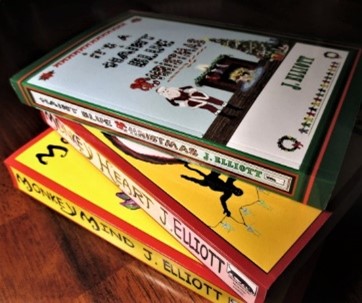
This’ll sound crazy obvious, but I promise there’s a point here: short stories tend to take place in a short amount of time. Duh. It might all take place in a coffee shop in an hour or over a day or a weekend. You might even write the whole story in one sitting. Not too hard to keep track of the weather, the season, time of day, or wildlife activities. It’s easy to write about Christmas at Christmas time. Cold. Holiday music, holiday food, fire in the fireplace, hot cocoa, peppermint tea, thumbprint cookies.
All good.
The thing about a novel is that it takes more than one season to write. Sometimes years’ worth of seasons.
 I started Monkey Mind in the early summer of 2014. Set in September of 2014, it took me about two-and-a-half years to write. Monkey Heart picks up in October of 2014 and culminates with Halloween of the same year. And It’s a Haint Blue Christmas followed, ending at the beginning of January 2015. Originally, that story promised to be much shorter than its predecessors, but no, the antics and mayhem would not be curtailed. Finally, in late 2021, It’s a Haint Blue Christmas joined the rest of the Haint Blue series. Yes, it took me seven years to move the tale forward over four months.
I started Monkey Mind in the early summer of 2014. Set in September of 2014, it took me about two-and-a-half years to write. Monkey Heart picks up in October of 2014 and culminates with Halloween of the same year. And It’s a Haint Blue Christmas followed, ending at the beginning of January 2015. Originally, that story promised to be much shorter than its predecessors, but no, the antics and mayhem would not be curtailed. Finally, in late 2021, It’s a Haint Blue Christmas joined the rest of the Haint Blue series. Yes, it took me seven years to move the tale forward over four months.
And I can say from hard-earned experience that it’s a bit tricky to write about Christmas in July. You’re wearing shorts and short sleeves, the sun doesn’t set until almost nine o’clock, sweat trickles down your back hour after hour. Planning the day around air conditioning and hydration is vital. In my case, at my age, add in a few hot flashes, and I’m fantasizing about shaving my head, not about donning scarves and mittens.
In Florida in July, you can also busy yourself playing connect the dots with the mosquito bites pockmarking your body. Or chigger bites, if you live in the woods. Or both. What’s that prickly, tingly feeling? Oh great, a tick heading toward my belly button.
Not a glimmer of holiday cheer. Not a thought of pumpkin spice latte.
It’s ridiculously easy to forget crucial details.
Rather late in It’s a Haint Blue Christmas, I conjured up a beefy biker character covered in tattoos. I began merrily describing the art adorning his shoulders, arms, knuckles. Oh, I could visualize him well! The muscles, the colorful tattoos … . Whoopsie. Hello. It’s supposed to be freezing outside. No, we can’t see his arm tattoos, he’s wearing a jacket and a scarf, you ninny. You’ll have to get him inside and have him take off the jacket if we’re going to see the skulls and flowers. I almost made the mistake of having my Hispanic mother throwing her chonkla (flip-flop) at her son. Hello, it’s Christmas dinner, it’s cold outside, she would hardly be wearing a chonkla. It has to be dressier and warmer.
Take another example of the importance of seasonality in fiction.
In “Bless Me, Father,” my short story set in snowy, blustery Boston, I had to remind myself that darkness falls early in winter. Around 4:30 p.m. … . So, no, we were not going to watch the sunset after dinner.
Yet another aspect of seasonality to be mindful of concerns wildlife, not just weather.
It so happens that back around 2014, I began a wildlife observation calendar. It rolls year to year, and the day isn’t important, but the time of year is. What did I see today? Two snakes mating or fighting in the creek. A bedded fawn. Overpowering smell of cat urine and larger-than-housecat claw marks around the poop pile. Hell-o, bobcat. Gangs of robins arrive and take over the lawn. Coyotes yipping, the sound carrying eerily through the cold night air. Sandhill cranes clacking and calling from the feathery clouds.
 Sure, you can look it all up online, but if you pull that detail from personal experience, it’s more vivid in your mind and imagination—that gorgeous sunset, that smell of fresh-cut grass, the bleating of baby goats. Or, in my case, the boinking armadillos on my doorstep. Good Lord, what is THAT? Oh my! Oh yes, I put their antics into Monkey Mind!
Sure, you can look it all up online, but if you pull that detail from personal experience, it’s more vivid in your mind and imagination—that gorgeous sunset, that smell of fresh-cut grass, the bleating of baby goats. Or, in my case, the boinking armadillos on my doorstep. Good Lord, what is THAT? Oh my! Oh yes, I put their antics into Monkey Mind!
Tips for Writing with Seasonality in Mind:
 Got a journal for seasonal notes? Take notes as the seasons change if you are planning a novel set in a familiar place. Temperatures. Sunset times. Wildlife migrations. Color of the sky. Seasonal activities. Foods. Holidays. School closings. Is your character slowed or stuck in traffic for a school zone? Not at the end of June!
Got a journal for seasonal notes? Take notes as the seasons change if you are planning a novel set in a familiar place. Temperatures. Sunset times. Wildlife migrations. Color of the sky. Seasonal activities. Foods. Holidays. School closings. Is your character slowed or stuck in traffic for a school zone? Not at the end of June!
 Got a tape recorder? My 2003 truck came with a little recorder on the sun visor. I thought at the time that it was a bit of nonsense until the day when I heard a funny story on the radio (called in to the “Bob and Sheri Show”) and wanted to remember it. “Story about a pregnant woman in a muumuu loading her groceries and the Little Debbie Snack Cake truck arrives just as a gust of wind catches her dress and blows it over her head… .” See also, “I’m driving towards Brooker, and there’s an oversized swim flipper on the side of the road near the cornfield. Thrown out the window? Odd. Wonder what happened? Possible magical realism story about swimming through the corn?” Or something like, “Just passed a man with a profound underbite and a goiter on his neck the size of a grapefruit—could be an interesting character.” I keep a little hand-held recorder in my purse. Have walked through the Waldo flea market describing market items for details. Very handy when jotting in your notebook just might not be convenient.
Got a tape recorder? My 2003 truck came with a little recorder on the sun visor. I thought at the time that it was a bit of nonsense until the day when I heard a funny story on the radio (called in to the “Bob and Sheri Show”) and wanted to remember it. “Story about a pregnant woman in a muumuu loading her groceries and the Little Debbie Snack Cake truck arrives just as a gust of wind catches her dress and blows it over her head… .” See also, “I’m driving towards Brooker, and there’s an oversized swim flipper on the side of the road near the cornfield. Thrown out the window? Odd. Wonder what happened? Possible magical realism story about swimming through the corn?” Or something like, “Just passed a man with a profound underbite and a goiter on his neck the size of a grapefruit—could be an interesting character.” I keep a little hand-held recorder in my purse. Have walked through the Waldo flea market describing market items for details. Very handy when jotting in your notebook just might not be convenient.
 Get yourself there. Get in the mood. Writing about a summer picnic in December? You might want to look at photos, videos, and crank up some summer songs to get your mind focused on the ants backstroking in the potato salad, the bees dive-bombing the sweet tea. Heck, paint your toenails bright pink if it helps. Is the watermelon juice running down your arm? Can you feel the seeds in your mouth? Wiping the dirt off the picnic blanket? Is that old swimsuit clinging to your body? Is the sprinkler on? Can you smell the dandelions?
Get yourself there. Get in the mood. Writing about a summer picnic in December? You might want to look at photos, videos, and crank up some summer songs to get your mind focused on the ants backstroking in the potato salad, the bees dive-bombing the sweet tea. Heck, paint your toenails bright pink if it helps. Is the watermelon juice running down your arm? Can you feel the seeds in your mouth? Wiping the dirt off the picnic blanket? Is that old swimsuit clinging to your body? Is the sprinkler on? Can you smell the dandelions?
Don’t Forget the Power of Music on the Imagination:
When I write spooky stories, I often listen to Orchestral Horror, an instrumental music channel on YouTube. When Haint and her friends were decorating the Lotus Lodge, I had Christmas music playing in the background while I looked at photos of Christmas gifts, home décor suggestions, researched popular scents for candles.
Writing a novel takes a long time, and it’s all too easy to insert details not in tune with the seasons. Even short stories could use a once-over for gaffes about weather changes So along with the usual manuscript checks for characters’ names and hair color, consider the seasons as well.
[Editor’s note: WAG would love to see articles on any and all topics of interest to writers. Please send your ideas or finished pieces to Cynthia D. Bertelsen at BlogEditor@writersalliance.org for consideration. Remember: these posts are more than just posts, for they are actual articles and can be cited in your CV/résumé in the same way you would a short story, essay, or any other writing credit you may possess.]

Connie Morrison
Great information, Jess. And yes, I’ve often said to myself how difficult it is to imagine winter in the summertime when it’s 95 degrees, almost impossible for me. And so, I think you may need to be somewhat of a genius and definitely in super conscious mode to be able to write about “out of season” settings! I admire every writer who can do this.
Jess Elliott
Thanks! Glad it was helpful. It seems so obvious, but when you are in it, it isn’t!
Skipper Hammond
Punch in the gut reminder. I haven’t mentioned weather, hot or cold, wet or dry, in the book I’m about to finish. So, here goes another editing pass.
Jess Elliott
Happy it’s helpful!